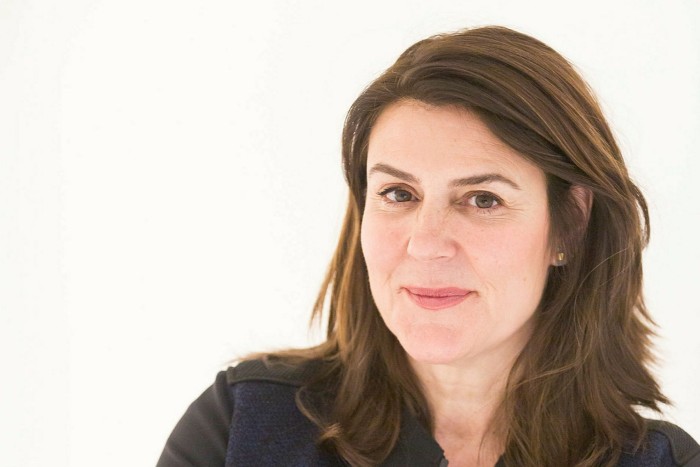Practical ways for women to reshape their careers

Roula Khalaf, Editor of the FT, selects her favourite stories in this weekly newsletter.
In the middle of the pandemic, Crystal Eisinger reinvented her career. She quit a senior marketing job at Google, used her savings to buy her favourite local café, and became chief executive of a music-streaming start-up, Keakie.
“Big corporations are a brilliant training ground but they can also be hierarchical and slow-moving,” she says. “Lockdown forced me to get off the treadmill, identify what was making me unhappy and make some dramatic changes.” Now, Eisinger is raising £3mn for Keakie’s pre-Series A funding round and has revamped the café, Urban Pantry, in Chiswick, London.
She is one of many who have re-evaluated their careers.
In last year’s so-called Great Resignation, swaths of workers left their jobs for better paid and/or more fulfilling work.
“Unexpected events or shocks like the pandemic create fertile conditions for major career changes by causing us to reflect on our priorities,” says Herminia Ibarra, organisational behaviour professor at London Business School, and author of Act Like a Leader, Think Like a Leader. “Faced with mortality, we ask the big existential questions and gather the courage to make changes.”

Lockdown also disrupted ties to jobs and workplaces, she adds. “It’s easier to consider doing something else when you are no longer immersed in the social circles and daily routines of your job.”
A study last year by McKinsey, the consultancy, found women globally had been disproportionately affected by the pandemic, with more women than men intending to change job or downshift. A Catalyst survey in 2020 had found that 62 per cent of female employees said Covid-19 would hurt their prospects for promotion at work.
A career pivot is a “necessarily messy journey of exploration”, says Ibarra. She suggests it should involve small, practical steps to discover new options, rather than leaping into the unknown and hoping for the best.

Start with a simple exercise, advises Jeremy Borys, a US-based managing director at global consulting firm AlixPartners. First, ask yourself: What do I want? What do I hope for? What can I deal with? What do I not want?
To move forwards, you also need to look back, he says. Think about the jobs you have done, the companies you have worked for and people you have worked with. What did you really enjoy?
“Don’t limit your definition of what the next role could be and don’t be blinded by salary or title,” says Borys. “When you’re doing something meaningful and fulfilling, the other things will come.”
What employers need to know
Encourage self-discovery
The post-Covid era will involve career change — wanted or not. Allow staff the opportunity to recharge and reinvent. “Organisations should give people time for self-reflection,” says Aniela Unguresan, at Edge. Indeed, UK fintech Monzo Bank is to offer its 2,200 staff a paid three-month sabbatical every four years, as it rethinks how staff should balance working life after the pandemic.
Stay connected
If you do lose employees, be sure to stay in touch. They may be exploring interesting new initiatives, and may even one day rejoin your organisation with new perspectives and ideas. “Nurture your alumni,” says Sarah Ellis, at Amazing If. “Your former employees can be your advocates as well as your future talent.”
Next, build your network. Instead of your safe and established network of friends and family, reconnect with the people you used to know — former colleagues, even people you went to school with. These “weak ties”, as Ibarra calls them, will help you think creatively about the future, open new doors, and avoid pigeonholing you.
Sarah Ellis, co-founder of careers adviser Amazing If and co-author of You Coach You, says “curious career conversations” are critical to a successful pivot. “Talk to people who are where you’d like to be. They’ll help you identify how you can transfer your talents in a useful way, and understand whether your assumptions about a career match the reality.”
To test the water, take on a new project at work or an extracurricular activity to boost skills and knowledge — whether that is volunteering, a part-time course or a side-hustle. The point is to try things out, experiment and adjust along the way. You don’t have to make a massive change overnight.
After the Great Resignation, employers have embarked on the Great Hiring, as companies try to rebuild talent. With businesses reporting a skills shortage, this may also be a good time to change direction in your current organisation.
“Employers should offer staff the chance to explore different opportunities and jobs inside the company — or risk losing them,” says Aniela Unguresan, co-founder of the Edge Certified Foundation, based in Switzerland, which assesses gender equality in the workplace.
“People who go through career shifts are generally more flexible, more agile, more resilient and more courageous,” she explains. “Those are fundamental and necessary skills in today’s workplace.”

In a period of change, there will be dead ends, false starts and unexpected turns. But it is better to try out a variety of options. “You will never have perfect information or get to the point where a pivot is 100 per cent guaranteed to work out well,” adds Ellis.
It has been six months since Eisinger left Google for the top spot at Keakie. At times, she says, what kept her going was the insight of Ginni Rometty, former chief executive of IBM, that growth and comfort rarely coexist.
In short: “You have to increase your tolerance to uncertainty,” says Eisinger.
Essay contest: Women in leadership in climate change

The Financial Times is launching its 10th annual Women in Business essay competition, in partnership with the 30% Club and Henley Business School. The prize is a fully funded place on Henley’s part-time Executive MBA programme, with the winner announced in the FT in the autumn.
The competition is open to women and men who have relevant experience. Entrants should answer this question in no more than 800 words: ‘Would efforts to tackle climate change benefit from more women taking the lead?’
Entries should be sent to mba@henley.ac.uk by 5pm, May 23 2022. Information, terms and conditions can be found at: hly.ac/wil2022
Comments